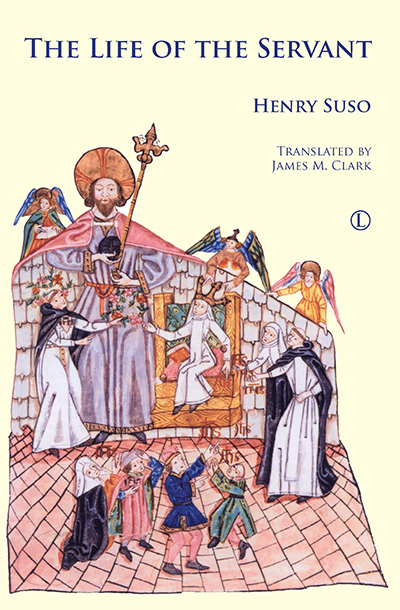Description
“If this is not heaven, I do not know what heaven is, for all the suffering that can ever be put into words, could not enable anyone to earn such a reward and forever possess it.”
A central figure in Christian mystical literature, the Dominican Prior Henry Suso was the writer of the seminal autohagiographical text The Life of the Servant. Transcribed by an enlightened amanuensis without his explicit consent, Suso began burning the manuscript until a heavenly missive from God decreed the text should be spared further desecration. The fragments remaining from that conflagration are vividly resurrected in this volume, elegantly translated by James M. Clark.
Suso’s subjective account of the spiritual and invisible world, told in prose of unsurpassed poetic beauty, reflects the ardent spirituality of his devotion. Informed by severe mortifications, visions, ecstasies and revelations, this canonical text endures as a remarkable cultural artefact. Resonating profoundly with contemporary concerns of austerity and materialism this classic text of mysticism is once again accessible to a new generation of readers and to those existing admirers seeking to re-evaluate its many virtues.
About the Author
Henry Suso OP (1300-66) was a German Dominican friar and a noted spiritual writer and mystic. His other spiritual writings include the Horologium Sapientiae (The Clock of Wisdom) and Exemplar Seuses (The Exemplar). He was beatified by by Pope Gregory XVI in 1831.
James M. Clark, late Professor of German at Glasgow University, is also the author of The Great German Mystics: Eckhart, Tauler and Suso.
Contents
Translator’s Preface
Part One
Prologue
Of the Divine Impression
I. Of the First Trials of a Beginner
II. Of the Supernatural Ecstasy which befell Him
III. How He married Eternal Wisdom in a Spiritual Manner
IV. How He wrote the Beloved Name of Jesus on His Heart
V. Of the Prelude of Divine Consolation by which God encourages many Beginners
VI. Of Various Visions
VII. The Rules He observed at Table
VIII. How He celebrated New Year
IX. Of the Words ‘Lift up Your Hearts’
X. How He celebrated Candlemas
XI. How He observed Lent
XII. How He celebrated May Day
XIII. Of the Sorrowful Way of the Cross, which He walked with Christ when He was led to His Death
XIV. Of the Useful Virtue that is known as Silence
XV. Of the Mortification of the Flesh
XVI. Of the Sharp Cross that He carried on His Back
XVII. Of His Bed
XVIII. How He broke off the Habit of Drinking
XIX. How He was led to the Spiritual School and instructed in the Knowledge of the true Self-Surrender
XX. Of the Painful Descent
XXI. Of Inner Sufferings
XXII. How He set out to bring Wholesome Help to His Neighbours
XXIII. Of Manifold Sufferings
XXIV. Of the Great Sorrow that came to Him through His Own Sister
XXV. Of the Deep Sorrow that once came upon Him through One of His Companions
XXVI. Of the Murderer
XXVII. In Perils of Waters
XXVIII. Of a Short Respite that God once vouchsafed to Him
XXIX. Of a Loving Account that He once Settled with God
XXX. How He once came Near to Death in His Sufferings
XXXI. How a Man should offer up His Sufferings in a Praiseworthy Manner to God
XXXII. How God in This World compensates a Suffering Man for His Suffering
Part Two
XXXIII. Of the Servant’s Spiritual Daughter
XXXIV. Of the First Steps of a Beginner
XXXV. Of the First Examples and Teachings for a Beginner, and the Need for Moderation in Austerities
XXXVI. Of the Childlike Devotion of a Beginner in Religion
XXXVII. How He drew Dissolute Persons to God, and comforted the Suffering
XXXVIII. Of a Sore Affliction that befell Him about this Time
XXXIX. Of Inner Suffering
XL. What Sufferings are the Most Useful to Man and the Most Praiseworthy to God
XLI. How He drew some Loving Hearts from Earthly Love to Divine Love
XLII. Of Certain Suffering Persons who were attached to the Servant with Particular Affection
XLIII. How Christ appeared to Him in the Shape of a Seraph, and taught Him how to Suffer
XLIV. How Firmly he must contend Who would win the Spiritual Prize
XLV. Of the Beloved Name of Jesus
Epilogue
Endorsements and Reviews
The Life of the Servant presents characteristics usually associated to religious literature, like The Confessions of St Augustine and The Imitation of Christ. It collects several personal experiences, told shortly but brightly. They are characterized from the typical literary expressiveness that introduces the medieval amorous poetry into a religious and sacred field.
Dialogo Filosofico, Vol 3, Issue 14






